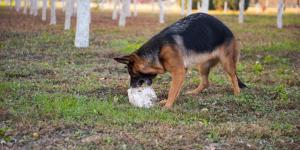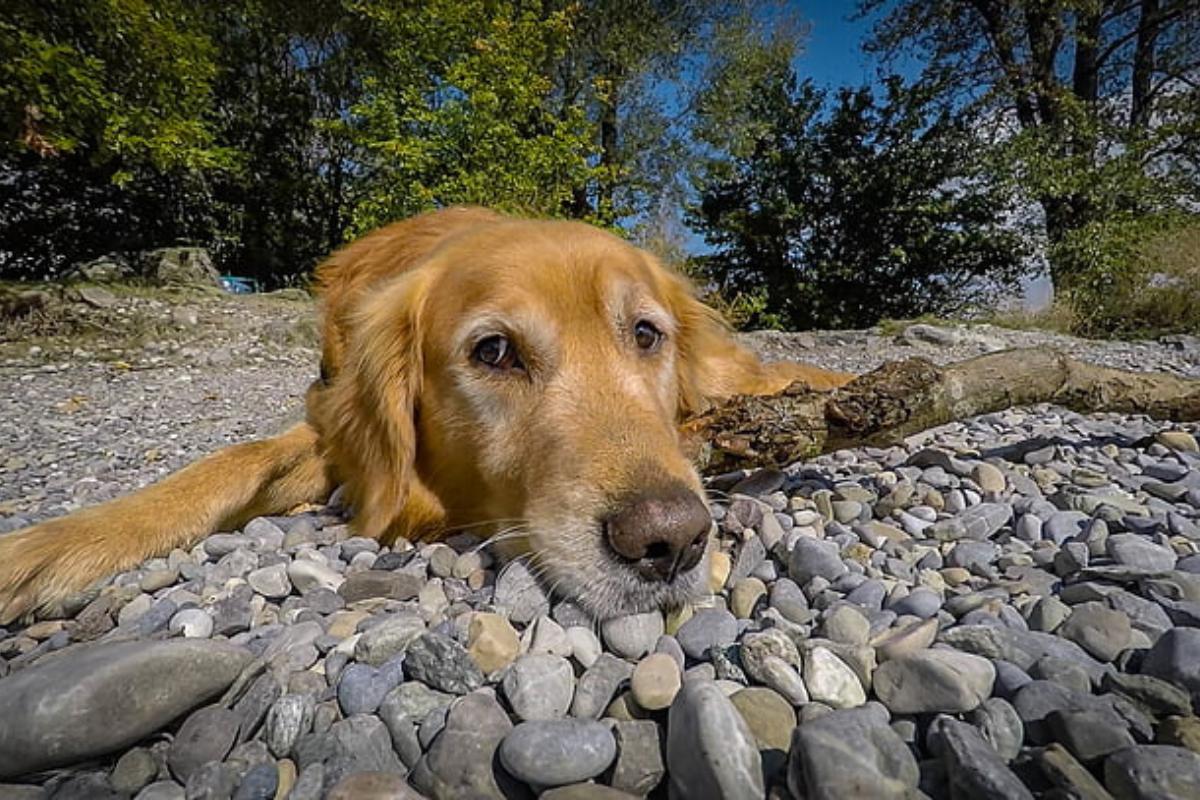Why Is My Dog Obsessed With Stones?



See files for Dogs
Let's face it, dogs are curious creatures. One minute they're chasing squirrels, the next, they're nose-deep in a patch of pebbles, completely entranced. This fascination with stones, while sometimes perplexing, is a common canine quirk. But, what drives this rock obsession? Is it a primal urge for prehistoric relics, a hidden treasure-hunting instinct, or simply a case of mistaken identity?
In this AnimalWised article, we delve into the intricacies of the canine mind to uncover the reasons behind why dogs develop an obsession with stones and, more importantly, provide insights on how you can effectively stop this behavior.
Why is my dog obsessed with stones?
Understanding why your dog is obsessed with stones involves exploring various factors. Let's delve into the reasons behind this intriguing behavior:
Evolutionary background:
Dogs have a long evolutionary history with their ancestors, some of which exhibited stone-related behaviors. Wolves, for example, might have used stones for various purposes like playing, hunting, or marking territory.
Furthermore, dogs have an inherent instinct to carry and collect objects. This behavior is deeply rooted in their evolutionary past, where such activities were essential for survival and pack dynamics.
Texture and taste:
Dogs are highly sensory creatures, and the different textures of stones can be appealing to them. The smoothness, roughness, or coolness of stones can provide a unique tactile experience. Dogs have an acute sense of smell and touch. Stones, with their various scents and textures, can engage a dog's senses in ways that are intriguing and stimulating.
Dogs explore their environment primarily through their mouths. Chewing and mouthing objects, including stones, is a natural behavior that helps them investigate and learn about their surroundings.
Associative behavior:
If your dog has had positive experiences with stones, such as receiving attention or treats when playing with them, they may develop an obsession as a result of positive reinforcement. Dogs are quick learners, and if they associate the act of interacting with stones with rewards or attention, they may be more inclined to repeat the behavior.
Health concerns:
Dogs might be drawn to smaller stones that pose a choking hazard. It's essential to monitor your dog's behavior and the size of the stones they are interested in.
Not only that, but chewing on hard objects like stones can contribute to dental issues, including cracked or worn teeth. Regular dental check-ups are crucial to address potential problems early.
Source: Waggel

Your dog bringing you stones is a fascinating behavior with a few possible explanations:
- In some cases, dogs view rocks as valuables and see presenting them to you as a form of offering a gift. This behavior stems from their natural instincts, where wolves and wild dogs would share their catches with their pack leaders. By bringing you a stone, your dog might be trying to show affection and strengthen your bond.
- Some dogs misinterpret the act of fetching as bringing anything they find interesting, including rocks. If you've ever played fetch with your dog, they might associate picking things up with getting praise and attention. So, bringing you a stone could be their way of initiating a game of fetch, hoping for your approval.
- If your dog feels neglected or bored, bringing you stones could be a way to get your attention, even if it's not the desired kind. They might be hoping you'll engage with them, play fetch, or simply acknowledge their presence.
- In rare cases, dogs might use unusual objects like rocks to mark their territory. If your dog brings you stones they find outside your home, it could be a way of claiming that area as part of their domain.
Understanding your dog's specific context and personality is key to deciphering their rock-bringing behavior. Observe their body language and what they do with the stone after bringing it to you. Do they wag their tail and expect a game of fetch? Do they seem nervous or anxious for your reaction? This can provide valuable clues about their motivation.
Do not miss this other article where we explain how to interpret dog body language.

Why does my dog chew or eat stones?
While playing with stones might be a funny quirk, chewing or swallowing them can be a cause for serious concern. This perplexing behavior can put your dog's health at risk, so understanding the reasons behind it is crucial. Let's delve into the various factors that could be driving this behavior:
- Nutritional imbalances: In some cases, dogs may be drawn to stones due to nutritional deficiencies. An inadequate diet may prompt dogs to seek out minerals present in stones, leading to an unusual eating behavior.
- Mental stimulation: Dogs need mental and physical stimulation to stay healthy and content. Chewing on stones could be a sign of boredom or a lack of adequate mental enrichment. Providing stimulating toys and activities can help redirect this behavior.
- Gastrointestinal upset: Some dogs may chew or eat stones as a response to gastrointestinal discomfort. Ingesting stones can act as a way for them to self-soothe or alleviate discomfort, albeit temporarily.
- Dental problems: Pain or discomfort in the mouth, such as dental issues, may drive a dog to chew on hard objects like stones. Regular dental check-ups are crucial to address and prevent potential problems.
- Compulsive behavior: Dogs, like humans, can develop compulsive behaviors. Chewing or eating stones may be a manifestation of compulsive tendencies, and addressing the root cause often requires professional intervention.
Keep in mind that some dogs might be drawn to smaller stones that pose a choking hazard. It's essential to monitor your dog's behavior and the size of the stones they are interested in.
You might be interested in this other article, where we discuss what is compulsive behavior in dogs.

How to stop my dog's obsession with
1. Rethink the fetch game
While replacing stones with a ball might seem intuitive, it's important to recognize that at the peak of your dog's rock obsession, a simple swap might not do the trick. We're not aiming to erase the stone association. Instead, our goal is to transform the obsessive behavior into a healthy and enjoyable activity still anchored in the "throw and catch" concept.
How? Introduce diverse throwing toys. Experiment with frisbees, rubber rings, or even homemade alternatives. Gradually, associate these exciting new toys with the familiar joy of chasing and retrieving. Celebrate successful catches with enthusiastic praise and rewards, making the transition a positive and enriching experience.
2. Seek expert guidance:
Tackling dog obsessions can be tricky, and most pet owners don't have a Ph.D. in canine behavior. That's why seeking expert help is crucial. Consult a veterinary ethologist or a certified canine trainer specializing in canine ethology. They have the knowledge and experience to develop a personalized treatment plan for your dog, using positive reinforcement techniques and behavior modification strategies.
3. Boost mental and physical enrichment:
While your dog undergoes professional treatment, keep boredom at bay with a vibrant mix of activities. Think beyond walks and engage their senses with scent work, agility training, or interactive puzzle toys. Consider canine sports like flyball or nosework if your dog thrives on challenges. Remember, a stimulated and satisfied dog is less likely to resort to obsessive behaviors.
4. Reduce alone time:
For dogs wrestling with behavioral issues, solitude can be a burden. Limit their alone time, especially during the initial treatment phase. Invest in interactive toys like Kongs to keep them occupied while you're away, and gradually acclimate them to being alone using positive reinforcement techniques. Remember, anxious or stressed dogs benefit from companionship and routine.
5. Build confidence:
Consistent training isn't just about tricks and commands; it's about building a strong bond and fostering your dog's overall well-being. Positive reinforcement training provides essential mental and sensory stimulation while offering alternative ways for your dog to find satisfaction and pleasure. This is especially beneficial for dogs with nervous, anxious, or obsessive tendencies, as it boosts their confidence and autonomy.
Don't underestimate the power of a structured training routine. Check out our comprehensive guide on "How to Train Your Dog" and our list of "Training Mistakes to Avoid" for valuable resources and helpful tips.
Remember, patience, consistency, and a collaborative approach with your dog's professional team are key to managing your dog's rock obsession and building a joyful, enriching life together.
Do not miss this other article where we discuss how long can you leave a dog alone at home.
How to prevent a dog from becoming obsessed with stones?
Obsessive behavior towards objects like stones, balls, or even toys can be a worrying development for dog owners. While these items can add to playtime and fun, unchecked fixation can pose risks to your dog's well-being. Fortunately, preventing these obsessions is both achievable and crucial for a balanced canine life.
The key lies in understanding the source of the issue: it's not the object itself, but how we introduce and manage it within our interactions with our dogs. By integrating games, activities, and toys within the framework of education, we can establish healthy boundaries and prevent unhealthy fixations.
Before engaging in any activity, fostering basic obedience commands like "sit," "stay," and "drop it" is essential. These commands form the foundation for structured and safe interactions, ensuring both you and your dog enjoy the experience.
When introducing specific objects, choosing appropriate and safe alternatives is crucial. Opting for rubber balls instead of stones minimizes potential hazards. However, simply replacing the object isn't enough. It's equally important to teach your dog appropriate play rules. This involves setting limits during overexcitement, promptly putting the toy away when playtime ends, and avoiding using play as a substitute for addressing boredom or stress.
Remember, games and activities should be perceived as rewards for good behavior, not solutions for negative environments. Earning playtime through obedience or good manners reinforces positive behavior and promotes a healthy relationship.
By implementing these strategies, we can effectively prevent object obsessions and cultivate a balanced life for our canine companions. Their world should be filled with enriching activities, joyful interactions, and controlled play, not driven by unhealthy fixations.
You might be interested in this other article, where we discuss why your dog might be obsessed with their ball.
If you want to read similar articles to Why Is My Dog Obsessed With Stones?, we recommend you visit our Behavioral problems category.








